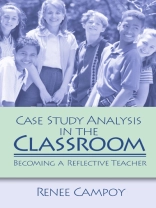‘Case Study Analysis in the Classroom encourages students to consider best practices in teaching and to solve problems concerning students who are gifted, underachieving, resistant to classroom learning, or who have special needs. This book is a valuable way to introduce students to the complex world of teaching and learning.’
–Arthur T. Costigan, Queen′s College, City University of New York
Stories of students in need, or of teachers who are struggling, draw readers into the process of solving classroom problems in a manner that traditional textbook formats are unable to match. Presented in an engaging and stimulating manner, Case Study Analysis in the Classroom: Becoming a Reflective Teacher provides beginning teachers a variety of typical classroom problems to analyze and solve. Solving the case study problems helps new teachers develop the knowledge bases they need to solve real problems in their own classrooms. More than a book of cases, it is an important starting point for students learning about case study research, especially the analysis of cases and their potential uses in the classroom. In addition, readers will also be guided through the process of reflective problem solving, developing an educational philosophy, and writing their own case studies.
Author Renee Campoy has written cases that tackle challenging and controversial problems. Her approach rests on the foundation that authentic learning and growth are best achieved through ideas that challenge assumptions and preconceived notions about education. A matrix of case studies is included that groups the cases by grade level, case focus, and primary educational topic, allowing students and instructors at all levels to customize their use of the book. Case study topics include
* Low academic achievement
* Learning disabilities
* Low motivation
* Misbehaving and disruptive students
* Reluctant readers
* High-stakes assessment
* Inappropriate scaffolding
* Cultural conflict
* Socioeconomic issues
* Attention deficit/hyperactive disorder
* Parent conferences
* Bilingual education
To support the problem solving process, each case study includes a rubric that provides feedback to the reader about the quality of their solution. The rubric is research based and written according to the King and Kitchener model of reflective judgment. This approach encourages teachers to apply their classroom experiences, knowledge of content, and understanding of learning theory during classroom problem solving.
Case Study Analysis in the Classroom is well suited as a text for courses throughout education curricula, including educational foundations, research methods, field experience and practicum, and instructional strategies courses. It will also be an invaluable desk reference for practicing teachers and administrators who need additional guidance on classroom problem solving.
Tabla de materias
Introduction to the Book and Case Study Analysis
Introduction to Case Studies
Learning to Use Case Studies to Solve Classroom Problems
Case Study One – Antonio Johnson
Case Study Two – Charlie Yazzie
Case Study Three – Hannah Wagner
Case Study Four – Amy Silver
The Process and Content of Reflection
Introduction to Reflective Problem Solving
Developing an Educational Philosophy
Using Case Studies to Reflect Upon and Analyze Educational Issues
Case Studies of Students with Exceptional Needs
Case Study Five – Gabe Silva, Attention Deficit/Hyperactive Disorder Student
Case Study Six – Lashandra Jones, Underachieving Student
Case Study Seven -William ‘Billy’ Stark, Behavior Disorder Student
Case Study Eight – The Kitipitiyangkul Twins, Bilingual Education
Case Study Nine – Amy Briggs, Reluctant Reader
Case Studies of Curriculum, Instruction and Assessment
Case Study Ten – The Case of the Inattentive Children
Case Study Eleven – High Stakes Assessment and the Biology Teacher
Case Study Twelve – The Case of Forced Scaffolding
Case Study Thirteen – The Case of the Mismatched Assessment
Case Studies of Classroom and School Context
Case Study Fourteen – The Case of the Wandering Student
Case Study Fifteen – The Case of the Black/White Question
Case Study Sixteen – The Case of the Cultural Clash
Case Study Seventeen – The Case of ‘How Can There Not Be a Christmas?’
Creating Your Own Case Study
Developing Your Own Case Study
Sobre el autor
Renee Campoy, Ed.D. has an educational background as an elementary teacher and now as a university professor. She has done extensive work with qualitative research methods and design and has also worked extensively with alternative assessment and instructional methods with classroom teachers. Her book, A Case Study of a Professional Development School (Greenwood) was published in 2000 and she also has a chapter in Effective Educational Partnerships (Greenwood), which published in 2002. She has been published in the following journals: Contemporary Education, The Professional Educator, Reading Improvement, American School Board Journal, SRATE Journal, and Kentucky ASCD Journal.












